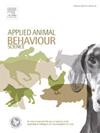Welfare impacts associated with using aversive geofencing devices on captive Asian elephants
Abstract
Animal-borne aversive geofencing devices (AGDs, or satellite-linked shock collars) are commercially available and used on livestock to restrict their movement within a virtual boundary. This technology has potential application as a human-wildlife conflict mitigation tool, where problem animals might be conditioned to avoid human-dominated habitats by associating an audio warning with a subsequent electric shock, which is delivered if the audio warning is ignored. Ensuring that high standards of animal welfare are maintained when implementing such tools is important for acquiring manager and community acceptance of such approaches. We conducted two pilot experiments with eight captive Asian elephants using mild electric shocks from a modified dog-training collar fitted around the neck, as part of an ongoing effort to develop AGDs suitable for mitigating human-elephant conflict. As part of these experiments, we assessed elephants' behavioural and physiological stress before, during and after the experiments. During the experiments elephants wore collars for up to nine consecutive days and received a small number of electric shocks on 1–3 consecutive days. Bootstrapped principal component analysis showed that daily activity budgets of individual elephants on experiment days were not different from the pre-experiment days. Generalised linear mixed-effects model (GLMM) showed that anxiety/stress behaviours increased on the first day of acclimatising to the collar and on testing days (i.e. days they received shocks) of the first experiment, but not during the second experiment relative to pre-experiment days. Analysis of faecal cortisol metabolite (FCM) concentrations using GLMM showed that FCM concentrations were higher in samples collected ∼24 hrs and ∼48 hrs after testing days compared to baseline levels as expected given the lag time for excretion of cortisol metabolites. These elevated anxiety/stress behaviours and FCM concentrations returned to baseline levels shortly after the experiment. Therefore, we conclude that AGDs did not produce lasting behavioural or physiological stress effects in elephants during this short-term study but recommend further studies with a larger sample of elephants to confirm the transferability of these findings.

 求助内容:
求助内容: 应助结果提醒方式:
应助结果提醒方式:


